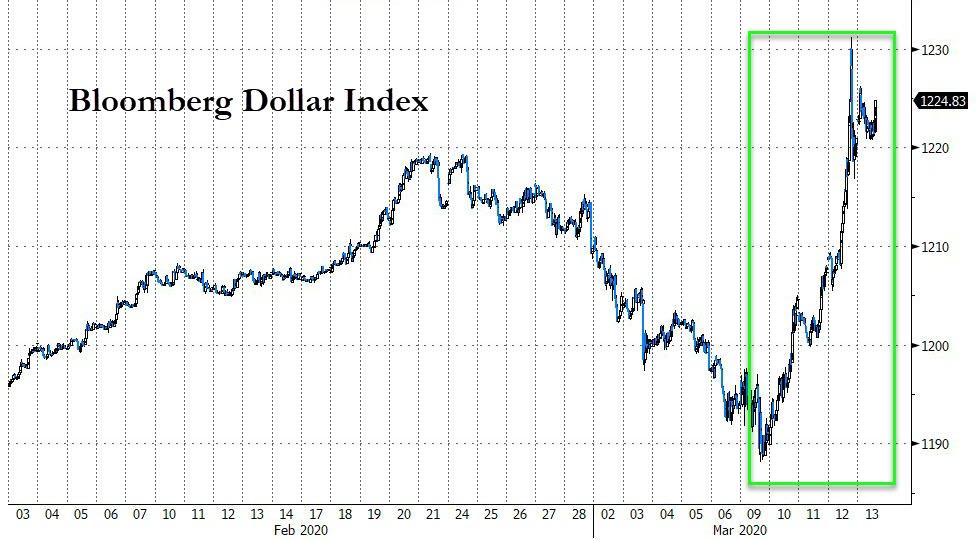In Traders’ Prayers, “Monetary Policy-Makers Have Taken The Place Of God”
Authored by Richard Breslow via Bloomberg,
Yesterday was an unusual day. In addition to all of the stunningly obvious reasons. Of which, I confess, finding the way Treasury yields behaved being the most intriguing. Usually, when markets sell off hard, people call — and after a few pleasantries (or growls) the inevitable questions get asked.
“Isn’t this overdone?” “When will it end?” Et cetera.
And, of course, “Why don’t they do something?”
The “they” shows how much financial markets have come to rely on their central banks to provide. In the prayers of traders, monetary policy makers have taken the place of God.
On Thursday what I heard was notably different.
During the worst of the price action, the calls I fielded included:
“Can I buy now?”
“I’m loving these bargain prices”
Or, my favorite as a global macro guy, “Of the following stocks, which would you start buying first?”
That’s rather remarkable.
Cash is indeed king, but apparently intended to be put to use lest it burn a hole in any pockets.
At the same time, speaking to a friend who is an attorney at a large firm specializing in trusts and estates, he said they have never had a busier week. Every elderly client wanted to make sure their affairs were in order. Have you ever heard of someone with a T&E practice pulling an all-nighter?
Who you talk to really does color perceptions of an event. One person’s threat is another’s opportunity. Like it or not, it surely encapsulates the reality of the post-financial crisis world.
It wasn’t surprising, but unfortunate, that ECB President Christine Lagarde came under such severe criticism for not giving the markets exactly what they wanted from policy and in words. We’ve become comfortable with futures pricing dictating the terms of engagement. How many times have you heard someone proclaim the central bank wouldn’t dare disappoint expectations. But, what she gave them will be far more constructive in the long run than merely serving up what traders were hoping to hear.
Granted the comments about the ECB “not here to close spreads” could have been said more eloquently. But it wasn’t as much of a misstatement as many claim. Her point was monetary policy can only go so far and central banks can no longer be the only game in town. She boldly threw down the gauntlet before the euro zone finance ministers scheduled to meet next week to do their part.
Global central banks are flooding the markets with liquidity. They are working to ensure the financial system keeps functioning. That is the most important thing they can do. And they are doing it. But to tide us over while a medical response is pursued, everyone knows, and has known, that it is the MIA fiscal policy that must be the answer. And, finally, someone was willing to put those decision makers on the spot.
The package the ECB came up with wasn’t parsimonious. It just wasn’t what speculators in BTPs were expecting to receive. It’s entirely possible, if not likely, that the 10 basis points that seem to matter to so many will be delivered in April. Lagarde will most likely also throw in some additionally favorable TLTRO terms. Spice things up with more QE. But she first needs, and is apparently willing to demand, an act of good faith on the part of the European governments.
It was hardly a coincidence that Bundesbank President Jens Weidmann promptly, and finally, said, “It’s really not the right time to be dogmatic about Black Zero.” That statement tells you far more than the “clarification” of Lagarde’s message by Italian Finance Minister Roberto Gualtieri which in effect said, “don’t worry, she does in fact love you.” Finance ministers are politicians and they ultimately understand the tide of history. If financial markets want to be optimistic, they should thank, not berate, her.
One thing that should also be remembered from this week is, that when it is all said and done, the dollar is still the ultimate safe haven and it is merely a luxury of better times that people feel comfortable selling it.
And bond yields down where they were on Monday ultimately offer no value. Especially if there is an increased likelihood of more appropriate stimulus.
Tyler Durden
Fri, 03/13/2020 – 08:31
via ZeroHedge News https://ift.tt/2TOAyAw Tyler Durden


